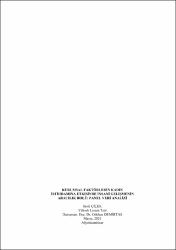Kurumsal faktörlerin kadın istihdamına etkisinde insani gelişmenin aracılık rolü: panel veri analizi
Özet
Bu tezin amacı kurumsal faktörlerin kadın istihdamına etkisinde insani gelişmenin aracılık rolünü panel veri analiziyle incelemektir. Çalışma, 79 gelişmekte olan ülkenin (yüksek gelirli OECD üyesi ülkeler hariç) 2002-2017 dönemi verisini kapsamaktadır. En küçük kareler, sabit etkiler ya da rassal etkiler modellerinden hangisinin etkin olduğuna karar vermek için model belirleme testleri kullanılmıştır. Modeller, kadın işgücü katılımının erkek işgücü katılımına oranı bağımlı değişken olacak şekilde kullanılmıştır. Kurumsal faktörler ise söz hakkı ve hesap verebilirlik, politik istikrar, hükümetin etkinliği, düzenlemelerin kalitesi, hukukun üstünlüğü, yolsuzlukla mücadele ve kurumsal kalite değişkeninden oluşmaktadır. Çalışma, insani gelişmişlik düzeyi yüksek olan gelişmekte olan ülkelerde kurumsal faktörlerin kadın iş gücü katılımına etkisinin pozitif olduğu hipotezine dayanmaktadır. İnsani gelişmenin aracılık rolünü ortaya koymak için her bir kurumsal faktör değişkeniyle insani gelişme endeksinin çarpımından oluşan etkileşim terimlerine yer verilmiştir. Bu hipotezi test etmek için kurumsal faktörler ve insani gelişme endeksi arasında etkileşim terimleri oluşturulmuştur. Çalışmanın temel sonucu kurumsal faktörlerin kadın istihdamı üzerine etkisinin negatif; etkileşim terimlerinin etkisinin pozitif olduğunu göstermektedir. Bu bulgu, insani gelişmenin aracılık rolü olduğu anlamına gelmektedir. The purpose of this thesis is to examine the moderating role of human development in the effect of institutional factors on women's employment using panel data analysis. The study covers data from 79 developing countries (excluding high-income OECD member countries) for the period 2002-2017. Model specification tests are used to specify whether the least squares, fixed effects or random effects models are effective. The ratio of female labor force participation to male labor force participation is used as the dependent variable in the models. Institutional factors consist of voice and accountability, political stability, government effectiveness, regulatory quality, rule of law, control of corruption, and institutional quality. The study is based on the hypothesis that the effect of institutional factors on female labor force participation is positive in developing countries with a high level of human development. Interaction terms are constructed between institutional factors and the human development index to test this hypothesis. The main result of the study shows that the effect of institutional factors on women's employment is negative and the effect of interaction terms is positive. This finding implies that human development has a moderating role.
Bağlantı
https://hdl.handle.net/11630/9797Koleksiyonlar
- Yüksek Lisans Tezleri [2074]



















